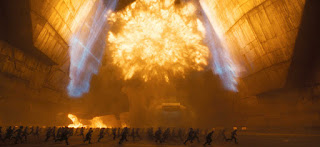It’s only fitting that I finish the month of talking about Denis Villeneuve films is by giving my own thoughts on his adaptation of Dune. This one got me hyped, so much so that I bought the book and read it in preparation for watching the movie when it came out. While it took a while, it certainly is an incredible achievement by Villeneuve for adapting one of the most influential books in sci-fi.
1. Paul Atreides
It wouldn’t be a sci-fi film unless we followed a young man throughout the movie. Paul is born of a royal family called House Atreides. He is haunted by vivid dreams of possible futures. I’ll get to that in a moment. After the Emperor has allowed the Atreides to take over Planet Arrakis, they are thrown into conflict as the rival House Harkonnen seeks to eliminate them for control of the Spice.
The Spice is the thing that is sought after among the Houses. Meanwhile, the shadowy Bene Gesserit, space witches, have been manipulating the conflict for their own needs. This is where Paul comes in as he is tested if he is the Chosen One for the witches. Paul is an interesting character in the film. There’s a sense of alienation since he’s being haunted by visions and having to move from his home to a world that is literally the opposite.
If there’s one scene that I like, it’s when Paul walks around the scenery as he and his family are moving. It says a lot without a word being uttered. As I mentioned, it reminded me of when Luke was looking at the Tatooine suns in Star Wars. Here, he looks as the ships arise from the planet’s oceans and he looks at the sun, evoking the same feeling when Luke yearns to be something in Star Wars.
Once again, as with Blade Runner 2049, the film subverts the chosen one trope. One of the best things to come from the book and with the film is that it presents the opposite idea of the Chosen One trope. What it’s getting at is this warning of worshipping the hero. We see when the Atreides arrive and the Fremen of Arrakis are chanting their word for savior to Paul. Compounding it is that he was supposed to be a woman, since the Bene Gesserit have been manipulating the Houses of the galaxy to their benefit. Paul unintentionally thrown a wrench at them but plagued with being the chosen one for the witches.
Thus, having him get differing visions of what might or might not happen. It’s the type of subversion and the material from the book that makes it so unique. Paul doesn’t want to be the one to have a fight and a war be about him or his family name. But in order to survive after the Harkonnens destroyed his home, he has to live among the Fremen. And make the difficult choices that will define him.
2. World Building
As I mentioned earlier, the book is loaded with detail. This film manages to pull it off without having it be too much for the regular audiences. Most of Denis’ filmography has a very minimalistic look to it. Even though it looks 10,000 years into the future, the tech looks dynamic but not too complicated for us to grasp.
Even adapting the various objects and nouns to the film is interesting. Such as seeing the Ornithopter in action is great. It looks like a dragonfly but we understand that it’s a futuristic version of what we think a helicopter will be in the future. Though the smartest thing to separate itself from other of its contemporaries is to not use blasters. Having the soldiers use swords is probably the ingenious way to make it antiquated and cool. And, since it’s not explained in the movie, the reason why none of the soldiers shoot a blaster is that their shields would explode. Causing them to, well let that idea run around in your head.
One last thing is talking about the villains or in this case Baron Harkonnen. He’s one of the most complex villain I’ve seen. Even though we see little of him, his overall size just exudes the creepiness to him. I mean, he’s so fat that he uses a machine to make him hover from the ground. One scene that defines who he is, is when the Bene Gesserit leader meets him. He promises to not harm Paul and his mother, but he sees it as nothing, since controlling the Spice means more to him.
3. A Brief History of Other “Dune” Adaptations
The whole history of adapting Dune is interesting, seeing how for awhile it was considered unfilmable. After it came out in 1969, Chilean film director Alejandro Jodorowsky was tasked with adapting the book to film. There’s a great documentary that detailed just how close it was to being filmed called Jodorowsky’s Dune.
In the 80s, experimental film director David Lynch was tasked with adapting the book. When you look at his filmography, nothing matches with his prior work with telling the complex story of Paul and the overarching story involving Spice. There’s two kinds of people that have seen his film: one is where they hate the movie since it tried to do too much. While the other love just how weird the film was stylistically. I haven’t seen it, but it’s clear that watching various clips, it’s not meant for me.
Lastly, there was a televised series that was done by the Sy-Fy channel, when it was spelled how you would spelled it. Again, I haven’t watched it and it’s one of those things where it makes sense to have the book be adapted to a limited series. It spawned a sequel series following the other books, and you probably guess what I think about it.
4. Overall
Dune is Villenueve’s high mark in terms of his filmmaking. Without a doubt, he is now part of the new face of filmmaking that has a distinct voice. And I’m looking forward to his part two of Dune.


































.jpg)

